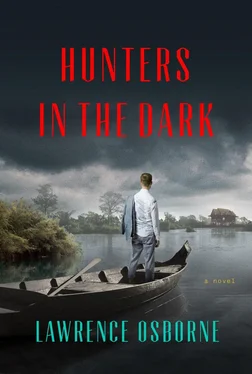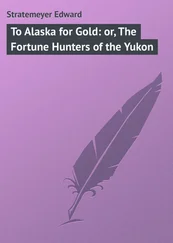Davuth told them a few stories he had cribbed from a guidebook and they listened as if he knew what he was talking about. He sat with his hands hanging between his knees. Already the hamlet by the water seemed a long way off. The sun began to dip toward the horizon as they soldiered on toward the summit. When they got there it was shining almost horizontally through the jungle into the prasat and its tumbledown shrine.
Two human figures were there. A young cowherd stood in the long grass at the edge of the clearing with four or five animals grazing. At the door to the temple an old man with disfigured ears sat begging in a monk’s robe. They walked around the prasat. Its bricks were as dark as brewed tea. The interior shrine was made of concentric rectangles of cracked stone rising to an open skylight. Wildflowers washed against the outer walls, dark gold and blue.
They sat on pieces of stone and waited for the dusk to come down. But the sea could only be seen through gaps in the dense jungle. Soon, the old man and the cowherd moved off, as lethargic as the longhorn cows. They could hear the bells of the latter tinkling as they receded down the hill. When they were alone, Davuth offered them a sip from his whisky flask and they watched the sun decline into a rising bank of rain cloud. Farther down the hill, Davuth said, stood a small seventh-century temple known as Ashram Maha Rosei, or the “sanctuary of the great ascetic.” Built of laterite, it was considered architecturally unique in Cambodia because of its remarkable Javan and Indian style — it was thought that parts of the Mekong were once ruled by Java. He seemed to know all about it. And indeed, Davuth had spent half the night reading up on the matter.
“Let’s go and see it,” he said, standing and brushing off the dust from his seat. “Then we’ll go down and find the boat.”
Robert, however, was feeling tired of the place already and refused to move.
“It’s all right,” he said. “Sophal, you go and look.”
Reluctantly, she agreed. “I’ll just be ten minutes. I’ll take some photos for you.”
“I’ll be here.”
“All right,” she said. “We’ll be back in a minute.”
She felt awkward leaving him, and she didn’t want to be alone with Davuth, but it was only a few hundred yards down the hill and there was no one else there.
Davuth led the way and he plucked out a switch from the undergrowth and playfully flicked it left and right as they made their way down a forest path. “Over there,” he said vaguely, pointing toward the east, “is Vietnam.” She wondered why guides always felt the need to point out the most mundanely obvious things, as if they were in danger of being left out of consciousness. When the path dipped more steeply on its way to the forgotten temple she looked up through the gaps in the trees and saw a soaring dusk cloud rising into the indigo sky. Its edges were brilliantly lit as if electrified from within, its apex snow-white and supremely elegant as it evolved ever upward. How far did such formidable clouds reach in their ceaseless straining for height and power? They seemed to be driven by awareness and desire for dominance. At its core, the cloud was almost black and one could taste the imminent rain on the lips. Davuth, too, stopped for a moment and looked up at it and his eyes went pale and empty and languid. For him, everything in the sky was an omen. Signs became material in the heavens and they were fashioned by multitudes of gods.
—
Robert also watched it, lying on his back on a carved plinth that must have been well over a thousand years old. He shaded his eye to look at it directly. One last slowed-down flash of light before dusk. A flicker of lightning from somewhere else. The forest quivered. He was glad to be alone for a while, to be cut off from living things. From a fair distance he could still hear the tinkle of the cowbells, the animals lumbering downward.
The recent days had been the loveliest so far and now he could see a little more clearly the uphill and pleasant path that might lie before him. His prospects, it was true, had no solid footing, but did they need to have one in this place? He could stay here until the ground solidified under his feet a bit. Sooner or later other doors would open to a charming and undesperate young man. The doctor was right: it was a country fast becoming rich and corrupt in novel ways. There would be unexpected openings in the years to come and those who stuck around and were patient would be able to profit from them almost unnoticed.
Gradually, he had lost his bearings in the face of these temptations. He had come to appreciate the power of secrecies and dissimulations practiced on a daily basis. Below him, vast as a labyrinth in a nightmarish myth, an ancient and subtle culture that the whites had settled on like flies on the surface of oily water, trembling and nervous and falsely righteous. The con men and the opportunists were little different from the pasty evangelicals and NGOs and savers of souls who you saw next to them huddled around tables in expensive restaurants every night. Indistinguishable to the Khmers. He was one of them and he no longer minded; con man or Baptist hustler saving children, it was not a chasm separating the two. The motives behind the two were not as dissimilar as either assumed. They both wanted a better life in a country where they could do what they wanted, where they remained unexamined. They were both frauds in their way, interlopers exploiting their whiteness. It was disgusting and comic, but in the end no one was going to punish either of these eternal types. The Samaritan and the criminal.
He himself could spend a lifetime here living off other people’s money. It could be done. He could be Simon for the rest of his life, living off that man’s unstable identity, and eventually he would actually become Simon. Unless, one fine day, Simon actually showed up. But he had an intuition about that. He sensed that it would never happen. Once a man cons you, he avoids you.
Then what if he was safe from now on?
When the first stars appeared he shook himself out of his reverie and sat up and saw behind him the moon which had risen over the Mekong. Shadowy longtails skimmed silently across the waters. He had forgotten the time a little and he realized now that almost an hour had passed. So they had not returned from Ashram Maha Rosei.
—
He went to the edge of the clearing and called out. Then he thought about the boat waiting for them on the mud beach far below. Would the man really wait for them so long and in the dark? He noticed how quickly the light was draining out of things and he wondered to himself if a certain urgency might be called for. Nevertheless, he ventured onto the path with an annoyed reluctance, not wanting to climb down merely to have to climb back up. And the mosquitoes were now out in force. He clucked and called out again and then cursed quietly and resolved to go find them. He swept down the overgrown path occasionally calling her name and feeling an increasing surprise that nothing came back at him. They must be inside the shrine, then, buried in masonry and out of earshot.
At the temple there was no one. He peered inside the unlit core and caught a whiff of stale incense and ash. He quickly looked around. It was a nuisance that they had gone off without telling him, leaving him alone in the jungle. But perhaps the best thing was to wait there.
He sat on the threshold of the shrine and soon he heard a clicking sound from a little farther down the hill. He got up and went back to the path and looked down into the gloom. Almost at once he saw a flicker of light, like a lighter being flicked on, and when it repeated he called out. It was now too dark to see anything but the vague shimmer of the Mekong below and the spark of light going on and off. A wave of fear came over him and he plunged down toward it with a hoarse yell, which to his surprise was simply her name. He came down into the thick undergrowth and when he was close enough to see that it was indeed a lighter he saw that they were sitting together under a tree, and that Sophal had her back to him and that she was sobbing.
Читать дальше












